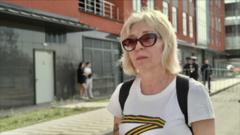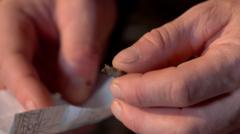The 80th anniversary of Russia's victory in World War II, marked by elaborate ceremonies and military exhibitions, reflects a national consciousness deeply rooted in historical triumphs. However, this celebration is complicated by the ongoing conflict in Ukraine, in which the Kremlin promotes a narrative that portrays modern military actions as a continuation of the struggles against fascism. This juxtaposition raises questions about memory, identity, and the realities of war in both the past and present.
Remembering Victory: Russia's Complex Legacy of World War II and Current Conflicts

Remembering Victory: Russia's Complex Legacy of World War II and Current Conflicts
As Russia commemorates the 80th anniversary of its World War II victory, historical narratives intertwine with contemporary conflicts, highlighting a national identity shaped by war.
Article text:
Eighty years after achieving victory in World War II, Russia commemorates this milestone with fervor, reinvigorating collective memories of the Great Patriotic War. In Dubna, a re-enactment of the final battle of Berlin captivates onlookers, symbolizing Russian triumph over Nazi Germany. Katya, whose grandfather perished in the war, reflects the generational ties to wartime valor, noting her son is currently engaged in what is termed a "special military operation" in Ukraine. Despite attempts to dissuade him, he enlisted, asserting his autonomy in a conflict that echoes the cruel realities of previous generations.
Soviet soldiers, including her grandfather, fought valiantly during an invasion that ended with staggering human losses—over 27 million Soviet citizens. As modern military efforts unfold in Ukraine, the Kremlin has reframed these actions as a fight against Nazism, drawing parallels to the historical narrative of World War II. This concept of a continuous struggle frames Russia as both a victor and a victim in the face of foreign aggression, giving rise to a narrative that few inside the country question.
Historical accounts are carefully curated, often ignoring elements such as the 1939 non-aggression pact between Stalin’s USSR and Hitler’s Germany. Current media portrayals position Russia at the forefront of a crusade against Eurofascism, reiterating a sentiment of distrust towards Europe that has existed since the Soviet era. As the Russian media underscores this message, national pride resonates through monuments linking past soldiers with modern-day fighters, while celebrations accelerate in anticipation of Victory Day.
With the bombastic displays of military power during parades increasingly prominent since Vladimir Putin's governance, the 80th anniversary is marked by patriotic fervor, with military vehicles rolling through Moscow’s streets. Yet projecting strength amid foreign tensions has not equated to success on the battlefield in Ukraine, where the ongoing conflict defies initial expectations of a swift resolution.
In light of rising geopolitical tensions, leaders from around the globe, including notable figures from Serbia and Slovakia, are set to attend the commemorations, despite a backdrop of recent drone attacks in Moscow. As citizens across Russia prepare for celebrations, personal narratives surface—like that of Fyodor Melnikov, who lost his brother to war. At 98, he expresses the haunting memories of conflict: "War is a terrifying thing," he shares, poignantly recalling a promise of victory that resonates through generations.
This anniversary highlights the dual nature of commemoration in modern Russia: celebrating historical victories while grappling with the profound costs of conflict, a juxtaposition that defines the Russian spirit as both resilient and reflective, simultaneously revering the past and confronting the present.
Eighty years after achieving victory in World War II, Russia commemorates this milestone with fervor, reinvigorating collective memories of the Great Patriotic War. In Dubna, a re-enactment of the final battle of Berlin captivates onlookers, symbolizing Russian triumph over Nazi Germany. Katya, whose grandfather perished in the war, reflects the generational ties to wartime valor, noting her son is currently engaged in what is termed a "special military operation" in Ukraine. Despite attempts to dissuade him, he enlisted, asserting his autonomy in a conflict that echoes the cruel realities of previous generations.
Soviet soldiers, including her grandfather, fought valiantly during an invasion that ended with staggering human losses—over 27 million Soviet citizens. As modern military efforts unfold in Ukraine, the Kremlin has reframed these actions as a fight against Nazism, drawing parallels to the historical narrative of World War II. This concept of a continuous struggle frames Russia as both a victor and a victim in the face of foreign aggression, giving rise to a narrative that few inside the country question.
Historical accounts are carefully curated, often ignoring elements such as the 1939 non-aggression pact between Stalin’s USSR and Hitler’s Germany. Current media portrayals position Russia at the forefront of a crusade against Eurofascism, reiterating a sentiment of distrust towards Europe that has existed since the Soviet era. As the Russian media underscores this message, national pride resonates through monuments linking past soldiers with modern-day fighters, while celebrations accelerate in anticipation of Victory Day.
With the bombastic displays of military power during parades increasingly prominent since Vladimir Putin's governance, the 80th anniversary is marked by patriotic fervor, with military vehicles rolling through Moscow’s streets. Yet projecting strength amid foreign tensions has not equated to success on the battlefield in Ukraine, where the ongoing conflict defies initial expectations of a swift resolution.
In light of rising geopolitical tensions, leaders from around the globe, including notable figures from Serbia and Slovakia, are set to attend the commemorations, despite a backdrop of recent drone attacks in Moscow. As citizens across Russia prepare for celebrations, personal narratives surface—like that of Fyodor Melnikov, who lost his brother to war. At 98, he expresses the haunting memories of conflict: "War is a terrifying thing," he shares, poignantly recalling a promise of victory that resonates through generations.
This anniversary highlights the dual nature of commemoration in modern Russia: celebrating historical victories while grappling with the profound costs of conflict, a juxtaposition that defines the Russian spirit as both resilient and reflective, simultaneously revering the past and confronting the present.





















